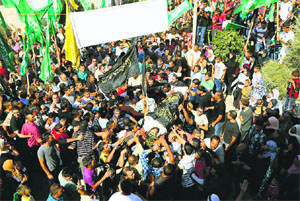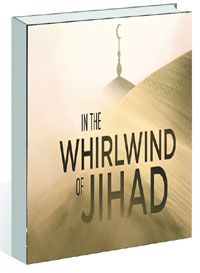|
Lucid scholarship on the Muslim world
Reviewed by B. L. Chakoo
In the Whirlwind of Jihad
by Martha
Brill Olcott. KW Publishers.
Pages 414. Rs 820.
the
title of this book, In
the Whirlwind of Jihad, comes from the struggle that the Quran
enjoins believers to engage in if they are to live lives that are in
accordance with the will of Allah. While most of the social science
literature about jihad focuses on jihad bil saif —
when believers engage in an armed struggle in defence of Islam – the
Quran terms this "a lesser jihad," as it is
the product of the circumstances in which a believer finds himself.
But every Muslim believer must engage in jihad al-nafs, ‘the
greater jihad’, as it is a struggle to rid evil from within
oneself."

Palestinians hold Hamas and jehad flags during Mohammed Assi’ funeral in the West Bank village of Beit Liqiya near Ramallah in October
Photo: Reuters |
This is what Martha
Brill Olcott writes in a brief but thoughtful "Preface" to
her In the Whirlwind of Jihad, which courageously examines the
role of Islamic jihad, and the intertwined nature of religion, the
state, and society in Uzbekistan, and "evolving relationships
among them." By probing the religious revival in Uzbekistan over
20 years of independence – introducing readers to the varied cast of
clergymen and government officials as well as to the different
interpretations of Islam, including the region’s "traditional
Hanafi school of Sunni Islam, Salafi fundamentalist critics," and
the teachings of Sufi saints – Brill Olcott’s judicious analysis
illuminates and demystifies Islam and asks the big questions about
what makes a true Islam. The result is a celebration of "pure
Islam," which — when studied more deeply and more seriously —
will spread toleration and brotherhood, and eradicate religious
illiteracy and put a stop to "our contradictions and splits and
purge our fanaticism, and our sinful affairs."
 However, the book also
curiously looks at the battles over ideas in Islamic thinking in
Central Asia and combines its sharpness of insight in showing "a
trajectory of development" that crosses national boundaries
within the region, including the various forms in which "the area’s
Islamic community responds to global Islamic influences. In fact, as
this volume, laudable, radical, pragmatic proceeds, it seems to grow
more and more interesting, not only because of additional information
on the role Islam has played in Uzbekistan in the recent past and
"what role it might play in the near future, but because a
certain conformity to deep and religious patterns in Muslim life is
made more evident. Written in lucid and unaffected style, almost all
the eleven chapters of the book objectively focus on the history of
Islam in Central Asia, or Islam in Uzbekistan. These chapters,
however, aim not so much at making Islam more accessible — one needs
a little help in that regard — as at providing contexts that will
enhance the understanding and appreciation of true Islamic Jihad and
Islam as "a dynamic faith and a global one." The volume
opens with an account of Islam in Uzbekistan which experienced an
Islamic revival in the 1980s, especially during the early years of
"independence when Uzbek state was weak." The five chapters
that follow address Central Asia’s Sufi leaders who made a unique
contribution to "the religious debate" on state-society
relations. Subsequent chapters not only register efficiently the
collapse of the Soviet Union that transformed Islam from a minority
religion to the majority religion of "newly independent
populations," but also take up important Islamic themes: Jihad,
Shahid, Faith, Grace and the exploitation of Muslims’ pervasive
ignorance of Sharia. They argue that a religion that comes from
"the heads and ideas of some people" is not "the
religion sent by Allah." The concluding chapters insistently warn
us that religion as a major force in Central Asian society has now
grown to "such proportions"that it has begun to have
political dimensions, raising "the risk that the proponents of
fundamentalist, Wahabist, radical or extremist Islam would seek
control of the state," which would ultimately emerge with
implications beyond the state’s borders. In each chapter, Olcott
proves to be an investigator of insight and originality. Lucid and
profound, dazzling in its scrupulous scholarship, this book is the
indispensible and authoritative guide for anyone who has ever wondered
what is going on in the Muslim world today. However, the book also
curiously looks at the battles over ideas in Islamic thinking in
Central Asia and combines its sharpness of insight in showing "a
trajectory of development" that crosses national boundaries
within the region, including the various forms in which "the area’s
Islamic community responds to global Islamic influences. In fact, as
this volume, laudable, radical, pragmatic proceeds, it seems to grow
more and more interesting, not only because of additional information
on the role Islam has played in Uzbekistan in the recent past and
"what role it might play in the near future, but because a
certain conformity to deep and religious patterns in Muslim life is
made more evident. Written in lucid and unaffected style, almost all
the eleven chapters of the book objectively focus on the history of
Islam in Central Asia, or Islam in Uzbekistan. These chapters,
however, aim not so much at making Islam more accessible — one needs
a little help in that regard — as at providing contexts that will
enhance the understanding and appreciation of true Islamic Jihad and
Islam as "a dynamic faith and a global one." The volume
opens with an account of Islam in Uzbekistan which experienced an
Islamic revival in the 1980s, especially during the early years of
"independence when Uzbek state was weak." The five chapters
that follow address Central Asia’s Sufi leaders who made a unique
contribution to "the religious debate" on state-society
relations. Subsequent chapters not only register efficiently the
collapse of the Soviet Union that transformed Islam from a minority
religion to the majority religion of "newly independent
populations," but also take up important Islamic themes: Jihad,
Shahid, Faith, Grace and the exploitation of Muslims’ pervasive
ignorance of Sharia. They argue that a religion that comes from
"the heads and ideas of some people" is not "the
religion sent by Allah." The concluding chapters insistently warn
us that religion as a major force in Central Asian society has now
grown to "such proportions"that it has begun to have
political dimensions, raising "the risk that the proponents of
fundamentalist, Wahabist, radical or extremist Islam would seek
control of the state," which would ultimately emerge with
implications beyond the state’s borders. In each chapter, Olcott
proves to be an investigator of insight and originality. Lucid and
profound, dazzling in its scrupulous scholarship, this book is the
indispensible and authoritative guide for anyone who has ever wondered
what is going on in the Muslim world today.
|